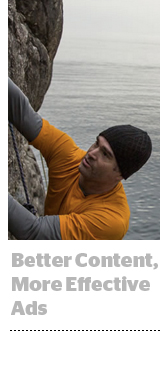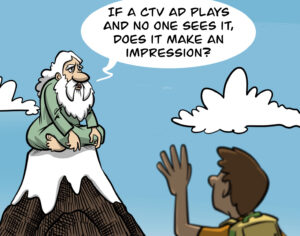 Last year, Remedy Health Media sites added video-heavy, multimedia content that explored life with chronic or life-threatening diseases.
Last year, Remedy Health Media sites added video-heavy, multimedia content that explored life with chronic or life-threatening diseases.
The sights and sounds of the patients evoked emotion in a way that articles couldn’t, which was the goal of these inspirational pieces.
But with digital, the delivery method counts. Remedy Health started big, with a short-form documentary format that took up to 30 minutes to view, divided into short video snippets that served as “chapters” to the story.
The snippets succeeded in engaging viewers. Readers engaged with the content on average for 8 to 10 minutes, with 18 page views, which is much longer than most other articles on the site.
Pharmaceutical companies pay to exclusively show ads next to this content, but it’s done in a subtle way. While most publishers create video content to pair with pre-roll, Remedy Health slotted in simple 300×250 banners interspersed between chapters.
“We found that’s all you need,” Remedy Health CRO Jim Curtis said. “Too much turns people off.”
The approach feels native because the content closely aligns with the ads, but patients don’t discuss drugs or treatments in the content because that would open a Pandora’s box of regulatory issues.
Early results from the project showed that on average, people who viewed the full-length videos were twice as likely to visit their doctor to talk about the advertised medication and three times more likely to request a prescription for the drug, according to an audience survey.
Those were strong results, but Remedy Health’s Adobe Analytics data suggested that the videos weren’t reaching all viewers because some dropped off before completion. Viewers were more likely to watch the videos in their entirety in the evening, but they were less likely to do so during the day.
So Remedy Health decided to make shorter videos with fewer chapters, which could more easily be consumed during daytime hours. It worked.
Following the project’s launch with four videos, Remedy Health has created 33 stories: 12 long-form and 21 short-form.
“With short-form storytelling, you can get through a moment in three to five minutes,” Curtis said. “We found that people were finishing the story in one sitting more often, and going through it more often.”
Next, Remedy Health plans to go even shorter with its video content. In 2016, it wants to distill the program down to emotionally evocative video snippets or photos along the lines of Humans of New York or National Geographic.
Remedy Health expects that these future moments will spur more sharing on social media. Though more than 10% of these articles are shared, it’s usually with close family and friends, not broader social networks. “They want to share [on social], but they don’t want to share a 30-minute immersive video experience,” Curtis said.
Such short snippets seem ideal for the patients and caregivers on Remedy Health who are increasingly consuming content on mobile, which accounts for half of traffic.
It might also be a way for the health and pharmaceutical advertisers working with Remedy Health to dip their toes into different waters. The advertisers tend to be conservative about using new platforms, for good reason: When Kim Kardashian touted a morning sickness drug on Instagram, the FDA got involved.
Beside social media aversion, other common tactics, such as retargeting, just don’t jibe in the health space. Imagine being retargeted with HIV drug ads after visiting TheBody.com.
“It becomes intrusive and at risk for revealing personal information,” Curtis said.
Remedy Health feels insulated from trends affecting other publishers, Curtis said. Most of its advertisers focus spend on search and display and not social media, for example. The things that make social media a good fit for many advertisers, such as its intimacy and rich data, make it potentially creepy territory for health care.
That’s why Remedy Health isn’t pushing advertisers to new formats but focusing on innovating its own content to make it richer and more emotionally engaging. It also responds to its data, which offered the insight to create shorter, more bite-sized pieces of content.
“Matching data with emotional engagement is why these programs have been so successful for our advertisers,” Curtis said.













